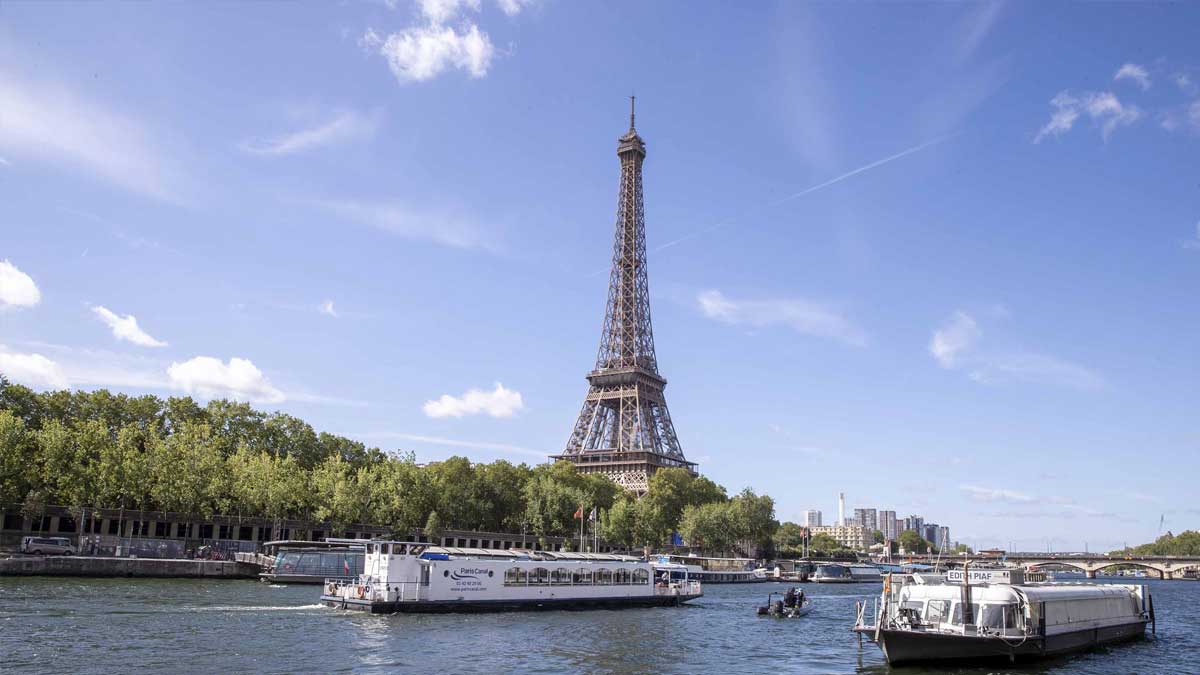- Home
- Billionaires
- Investing Newsletters
- 193CC 1000
- Article Layout 2
- Article Layout 3
- Article Layout 4
- Article Layout 5
- Article Layout 6
- Article Layout 7
- Article Layout 8
- Article Layout 9
- Article Layout 10
- Article Layout 11
- Article Layout 12
- Article Layout 13
- Article Layout 14
- Article Sidebar
- Post Format
- pages
- Archive Layouts
- Post Gallery
- Post Video Background
- Post Review
- Sponsored Post
- Leadership
- Business
- Money
- Small Business
- Innovation
- Shop
Recent Posts
Paris Olympics Swimming Events at Risk Due to Seine Pollution

As the 2024 Paris Olympics approach, concerns about pollution in the River Seine have raised the possibility that some swimming events might be canceled or postponed. This issue comes less than a month before the games are set to begin, after the city’s water supply company, Eau de Paris, reported unsafe levels of E. coli in multiple sections of the Seine. Despite ongoing clean-up efforts led by French President Emmanuel Macron and Paris Mayor Anne Hidalgo, who assure that the river will be ready for the events, the situation remains uncertain.
Eau de Paris announced on Friday that the Seine has shown unsafe E. coli levels for three consecutive weeks at several locations, with one area recording levels approximately double the safety limit set by the World Triathlon Federation. The company’s findings have added to the growing concern over the river’s water quality, which is crucial for the Olympic swimming and triathlon events.
According to a statement from Hidalgo’s office, the river’s water quality is currently “degraded” due to “unfavorable” conditions, including unusually high temperatures and rainfall. The Surfrider Foundation Europe, an environmental NGO, conducted 14 water tests from two key locations on the Seine—one of which is the starting point for the Olympic triathlon and marathon swimming events—between September and March. None of the samples met European Union standards, with only one location showing non-alarming bacteria levels.
Tony Estanguet, President of the Paris Organizing Committee, has expressed cautious optimism. He stated that while officials are hopeful the Seine will be usable, a final decision could be made if adverse conditions persist, particularly if heavy rainfall causes further increases in E. coli levels.
The International Olympic Committee has indicated that if the river’s water quality fails to meet standards, the triathlon might be canceled or modified into a duathlon, which would consist of running and cycling only. Pierre Rabadan, Paris’ Deputy Mayor for the Olympics, suggested that prolonged rainfall leading up to the races could further compromise the river’s water quality, potentially affecting the feasibility of swimming events.
Brazilian swimmer Ana Marcela Cunha, who won gold in the women’s marathon 10-kilometer swim at the 2020 Tokyo Olympics, has voiced concerns over the Seine’s pollution. Cunha emphasized the need for a contingency plan if swimming in the river proves unviable. She criticized the river’s suitability for swimming, and some local residents are even planning a “poop protest,” where they would defecate in the river to draw attention to the pollution issue.
In contrast to these concerns, Macron and Hidalgo are committed to demonstrating their confidence in the river’s condition. Both have pledged to swim in the Seine to highlight the city’s efforts to clean it up. Hidalgo recently postponed her planned swim due to an upcoming election but affirmed that the river is “ready.” Macron has framed the cleaning of the Seine as a significant legacy of the Olympics, stressing the importance of including the river in the games.
The city of Paris has invested $1.5 billion over several decades in efforts to rehabilitate the Seine for public use. This funding has gone toward upgrading the city’s sewage systems and stormwater treatment facilities. Despite these efforts, public swimming in the Seine has been prohibited since 1923 due to safety concerns. Paris’s single drainage system, which can become overwhelmed during heavy rains, often leads to excess water being discharged into the river.
The Seine’s water quality issues have previously led to the cancellation of the Open Water Swimming World Cup Paris last year, with World Aquatics noting that the water quality remained below acceptable standards. The organization highlighted the need for robust contingency plans to safeguard swimmers’ health.
Looking ahead, Paris officials aim to open three open-air swimming areas by 2025 as part of their ongoing efforts to improve the Seine’s water quality. These projects are part of a broader initiative to restore the river’s health and make it safe for public use once again.
As the Olympics draw closer, the situation remains fluid, with final decisions on the swimming events dependent on the river’s water quality. The balance between ensuring a successful Olympics and addressing environmental concerns will be closely watched by both organizers and the public.
Recent Posts
Categories
- 193 Countries Consortium Partner1
- 193cc Digital Assets2
- 5G1
- Aerospace & Defense48
- AI37
- Arts3
- Banking & Insurance11
- Big Data3
- Billionaires958
- Boats & Planes1
- Business332
- Careers13
- Cars & Bikes79
- CEO Network1
- CFO Network17
- CHRO Network1
- CIO Network1
- Cloud10
- CMO Network18
- Commercial Real Estate7
- Consultant1
- Consumer Tech194
- CxO1
- Cybersecurity73
- Dining1
- Diversity, Equity & Inclusion4
- Education7
- Energy8
- Enterprise Tech29
- Events11
- Fintech1
- Food & Drink2
- Franchises1
- Freelance1
- Future Of Work2
- Games149
- GIG1
- Healthcare79
- Hollywood & Entertainment203
- Houses1
- Innovation46
- Investing2
- Investing Newsletters4
- Leadership65
- Lifestyle11
- Manufacturing1
- Markets20
- Media195
- Mobile phone1
- Money13
- Personal Finance2
- Policy569
- Real Estate1
- Research6
- Retail1
- Retirement1
- Small Business1
- SportsMoney42
- Style & Beauty1
- Success Income1
- Taxes2
- Travel10
- Uncategorized12
- Vices1
- Watches & Jewelry2
- world's billionaires927
- Worlds Richest Self-Made Women10
Related Articles
South Korea Plane Crash: A Tragic Loss and Global Mourning
The tragic plane crash at South Korea’s Muan International Airport on Sunday...
By 193cc Agency CouncilDecember 30, 2024H-1B Visa Debate Splits Trump Allies and Silicon Valley
The debate over H-1B visas has once again become a contentious issue,...
By 193cc Agency CouncilDecember 28, 2024Trump Moves $4B Stake in Truth Social Parent, Stock Drops 6%
Donald Trump recently transferred his 57% stake in Trump Media & Technology...
By 193cc Agency CouncilDecember 20, 2024House Rejects Trump-Backed Funding Bill, Shutdown Looms
The U.S. House of Representatives rejected a new government funding bill on...
By 193cc Agency CouncilDecember 20, 2024







Leave a comment